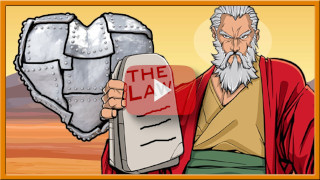Site last updated on February 22nd, 2026.
Site last updated on February 22nd, 2026.
Click on the quote below to read the article...

"A live-by-faith, work-for-God-not-money Christian community. We distribute Bible-based comics, videos, CDs, novels, and other tracts, and do free (voluntary) work. We are against hypocrisy and self-righteousness in the church; and we are in favour of honesty, humility and love."
- Details
This article was written in April, 2001, in response to warnings we received about our affiliation with The Religious Society of Friends, (Quakers). This article deals primarily with unprogrammed Quakerism, as practised mostly in Australia and the UK.
Americans credit the "Pilgrims" (in general) with their godly inheritance and with the religious freedoms that the country enjoys today. But most Americans do not know that the Pilgrims were largely divided into two camps. One was the hard-line Puritans, and the other were the various pacifist groups, such as the Amish, the Mennonites, and the Quakers.
Although both groups fled Europe because of persecution that they had received there, the persecution continued for some in the New World, at the hands of the hard-line Puritans. The Puritans were, like their persecutors in Europe, determined to purify the world by wiping out sin in others. Puritans banned Quakers in particular from coming to America, and they punished any shipping company that defied this ban. They arrested and even killed Quakers who managed to reach America despite their ban on them.
Eventually William Penn, a prominent Quaker in England, managed to acquire a colony to be used as a place of refuge for Quakers from their Puritan brothers and sisters in America. Pennsylvania, as the colony was called, became the spiritual home of the Amish and many Mennonites as well. The capital of Pennsylvania was Philadelphia, and Philadelphia became the birthplace of the American spirit of religious tolerance. While religious tolerance lives on as a legacy of Quakerism, the spirit of the Puritans continues to live on in the form of war-mongering and cult-busting of one form or another.
Quakers went on to campaign against slavery and to fight for prison reform, rights for women and children, and improvements in education. But to this day most Americans are still ignorant or indifferent about what Quakers teach.
Many Quakers were arrested in England simply because they took Jesus' teaching about not using titles literally. Quakers regarded all people as equals, and so they refused to remove their hats as a sign of obeisance to supposed superiors. They used the old English "thee" and "thou" in preference to "you", because grammar in those days stated that one was to be used for social equals and the other for social superiors.
Their sense of honesty won them respect in the business world, and as a consequence, some Quakers have become quite wealthy. However, they also teach "simplicity", which is a form of voluntary poverty. For some this means little more than a kind of "quiet" wealth; but on the whole it has led wealthy Quakers to support moves which other businesses have instinctively resisted solely on the grounds that they would interfere with their profits.
Quakers are today deeply concerned about environmental issues, about pollution, and about multi-nationalism.
Quaker meetings for worship are the ultimate in simplicity. There are no paid preachers, no sacraments, and no religious objects in their meeting houses. They generally gather in a circle, and spend an hour in silence, with each person waiting on God to speak to them personally. If someone receives a message from God which they believe is intended for the entire group, they share it briefly, and it is received without comment from the others. The meeting ends when the clerk or elder in charge shakes hands with the person next to him or her, and this handshake is passed on around the room.
It is never easy to say what Quakers teach, because The Religious Society of Friends has no universally agreed upon creed. Each individual is left to work out their own understanding of God and his plan for their life. The feeling is that true faith is an intensely personal thing which springs out of personal experience more than from a theological statement. Quakers believe that by creating an environment where no one will be badgered into saying that they believe something which they do not wholeheartedly support, everyone will be able to move gradually toward ultimate truth.
There is a Quaker maxim which says, "It is not true just because Jesus said it; but Jesus said it because it is true." From this, we can see that they do not even require blind submission to what Jesus taught. Nevertheless, experience has shown that individual Quakers have generally moved closer to the teachings of Jesus as they have been left to find God for themselves.
Quaker opposition to war has probably been the most lasting and universally accepted teaching of this movement. It comes from their conviction that "there is that of God in every person". This is an extension of the Christian teaching that "inasmuch as you have done it unto the least of these, my brethren, you have done it unto me."
Quakers seek to find some good quality even in their worst enemies, and to focus on loving and nurturing that quality rather than resisting the evil in that person and others like them through carnal weapons. Quakers have actively worked to encourage diplomatic dialogue between warring nations, and they have also been active in helping with reconstruction (both physically and spiritually) in countries that have been devastated by war.
All of this does not make Quakers perfect. Many of their teachings have been abused. It is our own opinion that factions have used teachings about tolerance to promote doctrines which are inconsistent with the will of God. But history has shown that abuses occur in every other religious organisation as well. For the moment, there seems to be no escape from abuses. We do not believe that God will hold sincere individuals responsible for the sins of others with whom they are affiliated, so long as we personally walk in all the light that we have. It may be that some will feel called to sound a trumpet of warning against abuses and excesses. But we would caution even those people to be careful that they are not overlooking sin in their own lives in the process. It is so easy for a Puritan spirit to demand purity on the part of others that we have not yet attained ourselves.
(See also The First Rule is: There are no Rules.)
Register or log in to take the quiz for this article




















